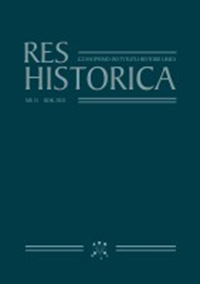Linguistic (?) Image of the Past (?), i.e. What is Hidden Behind Historical Narrative...
Linguistic (?) Image of the Past (?), i.e. What is Hidden Behind Historical Narrative...
Author(s): Marek WoźniakSubject(s): History
Published by: Wydawnictwo Naukowe Uniwersytetu Marii Curie-Sklodowskiej
Keywords: past; image of the past; language; historical narrative; language turn
Summary/Abstract: The article addresses problems concerning consequences of the so-called „language turn” for the reflections on broadly understood historical narrative. In general remarks indicate reasons for changes that have taken place (and are still ongoing) in the area of historiography/historical writing, mainly those related to the inclusion of the nonclassical approach – based on different principles than the classical/traditional ones – to the language of historical narrative/historical writing/historiography, and the related consequences for the historians’ research practice. I also point out one of the (possible) ways which serves to explain the changes that took place in the field of historiography in the last decades, being in fact the consequence of discussions/reflections on the foundations of (scholarly) cognition that is/can be a reference to a certain rivalry between an objectivist and constructivist model of cognition. Simplifying the problem quite considerably, I argue that one of the most important, and – subsequently – also meaningful, elements of dispute between the objectivist model of cognition and the constructivist model of cognition was the discussion/reflection on the role of language in cognition (including the learning of the past). I assume that the possible answers – should the title of the article be recognised as a question – are dependent on a complex notion of culture and language, and the interest of historians in the narrative’s language shifted scholars’ interest from „reconstruction of the past” to the linguistic (language understood broadly there as a cultural code) images of history. Researchers’ interests in the „images of the past”/”linguistic images of the past” allowed not only to notice and refl ect on the limitations of historical knowledge (also in order to identify and marginalise them) or to rationalise the adopted (consciously or not) assumptions/prejudices, but simultaneously opened historical field towards new research areas, thus broadening the cognitive horizon of historiography.
Journal: Res Historica
- Issue Year: 2021
- Issue No: 51
- Page Range: 705-716
- Page Count: 12
- Language: English

